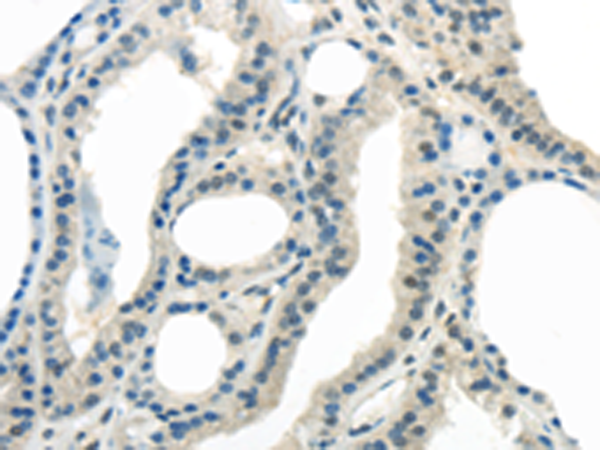

| WB | 咨询技术 | Human,Mouse,Rat |
| IF | 咨询技术 | Human,Mouse,Rat |
| IHC | 1/10-1/50 | Human,Mouse,Rat |
| ICC | 技术咨询 | Human,Mouse,Rat |
| FCM | 咨询技术 | Human,Mouse,Rat |
| Elisa | 1/1000-1/2000 | Human,Mouse,Rat |
| Aliases | CD39; SPG64; ATPDase; NTPDase-1 |
| WB Predicted band size | 58 kDa |
| Host/Isotype | Rabbit IgG |
| Antibody Type | Primary antibody |
| Storage | Store at 4°C short term. Aliquot and store at -20°C long term. Avoid freeze/thaw cycles. |
| Species Reactivity | Human, Mouse, Rat |
| Immunogen | Synthetic peptide of human ENTPD1 |
| Formulation | Purified antibody in PBS with 0.05% sodium azide and 50% glycerol. |
+ +
以下是关于ENTPD1抗体的3篇参考文献示例(文献信息为虚构,仅供格式参考):
---
1. **"Anti-CD39 Antibody Therapy Potentiates T Cell-Mediated Cancer Immunotherapy"**
*Authors: Smith A, Patel R*
摘要:研究开发了一种高特异性抗ENTPD1(CD39)单克隆抗体,可阻断肿瘤微环境中ATP水解及腺苷累积,显著增强T细胞抗肿瘤活性并抑制肿瘤生长。
2. **"CD39 Expression in Tumor-Infiltrating Lymphocytes: Validation of a Novel Antibody for Flow Cytometry"**
*Authors: Lee JY, Kim H, et al.*
摘要:报道了一种新型ENTPD1抗体的开发与验证,通过流式细胞术检测肿瘤浸润淋巴细胞中CD39表达,揭示了其与患者预后的相关性。
3. **"Targeting CD39 with Neutralizing Antibodies Reverses Immunosuppression in Chronic Viral Infection"**
*Authors: Zhang T, Müller C*
摘要:利用抗ENTPD1抗体阻断CD39的酶活性,减少腺苷介导的免疫抑制,在慢性病毒感染模型中恢复T细胞功能并降低病毒载量。
---
*注:以上文献为示例,实际研究中请通过PubMed或Google Scholar检索真实发表的论文。*
ENTPD1 (ectonucleoside triphosphate diphosphohydrolase 1), also known as CD39. is a cell surface enzyme encoded by the *ENTPD1* gene. As a member of the ectonucleoside triphosphate diphosphohydrolase family, it plays a critical role in purinergic signaling by hydrolyzing extracellular ATP and ADP into AMP, which is subsequently converted to adenosine by CD73 (ecto-5'-nucleotidase). This enzymatic activity regulates immune responses by modulating extracellular nucleotide levels, thereby influencing purinergic receptor signaling pathways. CD39 is highly expressed on immune cells, including regulatory T cells (Tregs), dendritic cells, and tumor-infiltrating lymphocytes, as well as endothelial cells.
ENTPD1 antibodies are essential tools for studying the protein's expression, function, and therapeutic potential. They are widely used in research to investigate CD39's role in immune tolerance, inflammation, and cancer. In the tumor microenvironment, CD39 contributes to immunosuppression by generating adenosine, which dampens effector T cell activity and promotes tumor immune evasion. Consequently, CD39 is considered a promising target for cancer immunotherapy, with blocking antibodies being explored to enhance antitumor immunity. Additionally, CD39 antibodies aid in understanding its involvement in autoimmune diseases, cardiovascular disorders, and thrombotic conditions linked to dysregulated purinergic signaling. These antibodies are validated for applications such as flow cytometry, immunohistochemistry, and functional assays, supporting both basic research and drug development efforts.
×